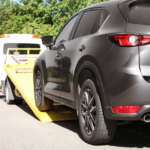If you’ve noticed your car insurance rates going up, you’re definitely not alone. Recent data from Bankrate shows that car insurance premiums have shot up by nearly 15% in some states. Nationally, the average premium has increased by over $240, reaching a not-so-wallet-friendly $2,014 per year. Ouch!
And the bad news doesn’t end there. Experts predict that things won’t get any cheaper in the coming year. In fact, U.S. car insurance rates are expected to keep climbing another 8.4% by the end of the year, the biggest increase in six years.
So, buckle up and keep an eye on your insurance costs. It’s a bumpy ride ahead.
Understanding what affects your car insurance premium
If you’ve found yourself puzzled by the sudden increase in your car insurance premium, fear not; you are not alone. Before we look into that, though, we’ll first want to know what goes into a car insurance premium.
Your car insurance premium is the money you pay to an insurance company to protect your vehicle, yourself, and your passengers. You can be invoiced every month, every six months, or once a year.
Each company uses a unique formula to determine the cost, and since every driver is different, they ask a lot of questions during the application process, such as:
- Your age
- Your gender
- Where you live
- How long you’ve been driving
- Your driving record and any past claims you’ve made
- The type of car you own
- How much you drive
- Whether driving is primarily for work, to commute to work, or for pleasure
- Where you park your car when you’re not using it
- The specific coverage options you want
- How much of a deductible you’re comfortable with
Reasons why car insurance premiums change
- Those amazing discounts expired: Insurance companies often provide discounts to policyholders based on factors like safe driving, multiple policies, or loyalty. If any of these discounts have changed or expired, your premium may increase.
- You got a speeding ticket: Even if you haven’t had an accident, other violations or citations, such as speeding tickets or reckless driving, can affect your premium. A less-than-stellar driving record can signal a higher risk, causing your insurer to adjust your rates.
- You adjusted your coverage: Changing your coverage options, such as increasing liability limits or adding comprehensive coverage, can give you more extensive protection, but it can also lead to higher premiums.
- There was a drop in your credit rating: Your credit rating can have an impact on your car insurance premium. If your credit score has taken a hit or changed significantly, your insurer may perceive you as a higher risk, increasing your premium.
- Overall increase in claims & lawsuits: In recent years, there has been a rise in claims involving lawsuits. Legal and court expenses are substantial, prompting insurance providers to adjust premiums to account for these additional costs.
- Higher medical costs across the board: Medical expenses following car accidents have also been on the rise. If insurance companies anticipate increased medical payouts, they may adjust premiums accordingly.
- It costs more to fix cars these days: Modern cars have pretty impressive technology, but it comes at a price. Repairs and replacements for these advanced features can be expensive. As a result, insurers may raise premiums to cover the increased cost of fixing these fancier vehicles.
- More claims in your ZIP code: While you may not have been involved in an accident, the overall accident frequency and severity in the areas you live or work in can influence your premium. Car break-ins matter too! If incidents have become more common or severe in your area, insurance companies may adjust their rates accordingly to compensate for the heightened risk.
- You had a life event: Significant life changes may alter your insurer’s perception of risk. So, major life events, such as moving to a new place with different risk levels or adding a new driver to your policy, can impact your premium.
- You got new wheels: More expensive cars typically cost more to insure. So, buying (or being gifted) a new car, especially one with a higher value or statistically riskier (like a sports car), will likely see pricier premiums.
Tips to fight increases in what you pay for car insurance
Now that we’ve uncovered the reasons behind unexpected premium increases, let’s cover some practical tips for lowering your car insurance costs:
- Shop around for a new policy: Don’t settle for the first offer you receive. You’ll want to compare quotes from multiple insurance providers to find the best deal for your needs.
- Bundle with home or renters insurance: Bundling your car insurance with other policies like home or renters insurance often leads to substantial discounts. Consolidating your coverage can result in significant savings.
- Take a defensive driver’s course: Many insurers offer discounts to policyholders who complete defensive driving courses. Not only will you refresh your driving skills, but you might also enjoy a reduction in your premium.
- Maintain good credit: Regularly check your credit report and try to keep a healthy credit score. A strong credit rating can positively impact your car insurance premium.
- Review and adjust your coverage: Periodically review your coverage to ensure you have the right level of protection. Dropping unnecessary add-ons or adjusting your limits could lead to cost savings.
- Keep your old car a little longer — or buy a used one. New cars are always more costly to insure than older models, as long as they are still in good running condition with brakes, tires and maintenance done regularly.
Want to seek out a better deal?
If your car insurance premium has increased without any accidents on your part, there are numerous factors at play. It may be time to try something new.
Remember, facing a premium increase isn’t the end of the road. To find the best insurance options for you, reach out to Guided Solutions. Our agents will do the legwork for you, presenting tailored choices that suit your needs and budget.









